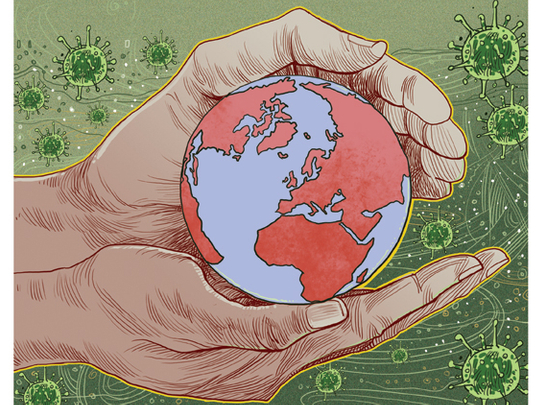
The bad news just doesn’t seem to let up. The other day my publisher friend Mariia emailed from Kharkiv in Ukraine. When I visited Kharkiv two years ago, it was poor, corrupt and dominated by a humungous statue of Lenin, and yet green, charming and peaceful. At least wars were over in Europe’s historic bloodlands, I thought then. Now, writes Mariia, refugees and orphans are streaming in from Donetsk and Lugansk down the road. Maimed soldiers fill Kharkiv’s military hospital. Mariia says: “We will have a lost generation. The time of Hemingway and Remarque returns.” Other former Soviet republics watch in terror.
“The summer of hate,” Dutch commentator Bas Heijne calls it. The news is bad indeed. Yet humanity’s longer-term trends are hopeful. Life for the average human keeps getting better.
On the news, the Syrian and Iraqi civil wars are merging, and may soon intersect with the Israeli-Palestinian conflict. In west Africa, the worst outbreak of the Ebola virus has killed more than 2,400 people, mostly in Liberia. The man who co-discovered Ebola in 1976, Peter Piot, now director of the London School of Hygiene and Tropical Medicine, told me: “This is getting out of hand. You have some doomsday scenarios.”
Imagine what could happen, he says, if one of the many Indians in west Africa caught the virus and carried it to an unhygienic Indian public hospital.
But, despite all the horrible news, the world has been steadily getting safer. Deaths in warfare have been falling for decades and probably centuries, as the Harvard psychologist Steven Pinker has charted. The global rate of war deaths, Pinker writes, slid “from almost 300 per 100,000 world population during world war two, to almost 30 during the Korean war, to the low teens during the era of the Vietnam war, to single-digits in the 1970s and 1980s, to less than 1 [this] century”.
True, deaths in conflict rebounded after 2005. Nearly 200,000 people were killed in Syria alone from 2011 through April this year, estimates the United Nations. Yet Pinker says we’re still at “a tiny bit over one” war death per 100,000 humans per year. Homicides, which are far more common than war deaths, are falling across the west.
And deaths from violence in recent years are vastly outnumbered by lives saved from infectious disease. Three great killers of poor people — Aids, tuberculosis and malaria — are in retreat.
Moreover, the worldwide death rate of children under five “roughly halved” between 1990 and 2012, says Unicef. The average human now lives to nearly 70. That’s 20 years more of life than in the early 1950s. Liberians have gained those 20 years since just 1992. On average, they now live to about 60.
In fact, a study published by the World Bank showed that from 1970 through 2008, death rates tended to fall even in war zones. The reason: gains from better health care trumped deaths from fighting.
Noting these happy trends should encourage action, not complacency. Usually, something can be done.
Piot, although anxious about the Ebola outbreak, believes medicine will probably advance fast against this disease too: “This should be the last epidemic where all we have is isolation and quarantine.”
The global health networks originally created to fight Aids can act quickly, he explains, and Ebola is a simpler virus than HIV. It’s just that the world never previously bothered much about Ebola because earlier outbreaks rarely killed more than 300 people, and only in poor African countries. Now drug trials have started. We could find an effective treatment within months.
Perversely, it helps that Ebola is telegenic: it kills in a week, whereas HIV can take a decade. This emergency is so spectacular, says Piot, “that I assume someone from the international community will pay”.
Rich countries understand, better than 30 years ago, that the world is connected. Western interest in Ebola soared after two Americans caught it in July, notes Piot.
The distinction between news and deeper trends is crucial. The French “Annales” historians taught us to see history not just as a parade of kings, wars and revolutions — “news”, if you like — but as a study of historical structures in the long term, the historian Fernand Braudel’s “longue durée”.
Of course, those longer trends could turn malign. The coming trend is climate change. We won’t prevent it, so we’ll have to suppress its effects as well as we have pestilence and war.
— Financial Times








